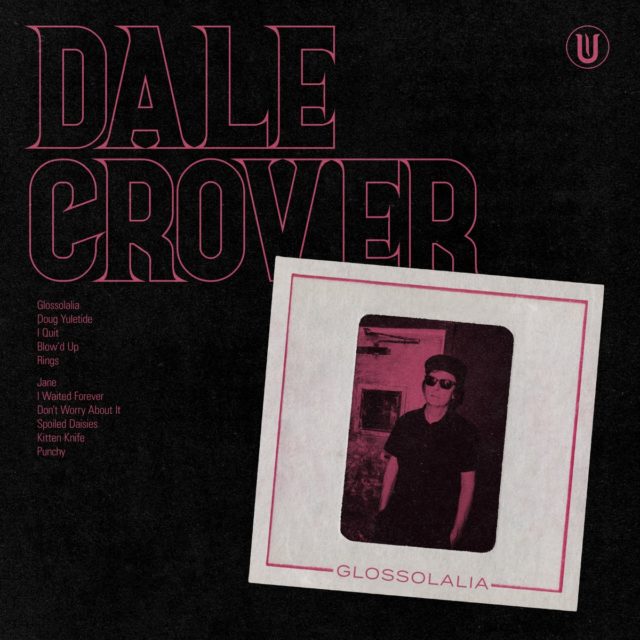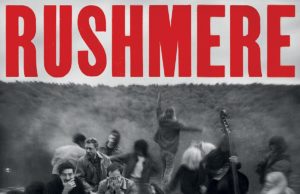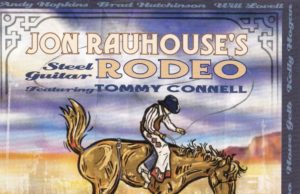THE EDITED PRESS RELEASE: “As he began plotting his new solo album, Dale Crover realized he was starting from scratch. The Melvins, Nirvana and Redd Kross drummer (and Altamont singer-guitarist) was already more than 30 years into a renowned career when he started work on his full-length solo debut — 2017’s The Fickle Finger of Fate. So he had a backlog of songs and ideas to draw on. Likewise, he incorporated older material into Rat-A-Tat-Tat!, which followed in 2021. But this time it was different: just Crover and a Tascam eight-track. “I didn’t have any songs,” Crover says. “So I just went on this writing spree.”
The result of that creative burst is Glossolalia, Crover’s third LP under his own name and arguably his most focused statement yet as a solo artist: 11 catchy yet eccentric tracks — demoed at home and later re-recorded with longtime Melvins engineer Toshi Kasai — that move from Nuggets-y garage-rock to crafty proto-metal riffage and gorgeously hazy psych-pop, and feature Crover’s songwriting, vocals and multi-instrumental talents alongside a number of illustrious guests, from past collaborators like Ty Segall to none other than Tom Waits. Crover’s prior releases took a more experimental tack, blending oddball textural interludes with more straightforward songs. This time the sound is streamlined, with a natural flow that carries straight through from the rollicking title track to eerily evocative closer Punchy. “Just having everything kind of fresh,” Crover says, “I got really inspired.”
Crover found the seeds of these songs in everything from his teen memory banks to recent books and films. The idea for Glossolalia itself came from a surreal experience Crover had in high school, when he got roped into playing drums at a church. “They’re doing this service and it’s starting to get kind of crazy: ‘Praise the Lord; praise Jesus!’ ” Crover recalls. Spotting a classmate, he was surprised to find her participating in a particularly intense way. “All of a sudden, she starts freaking out and speaking in tongues,” Crover says. “I was minding my own / You came along / Spoke with your tongue,” he sings on the track, a jangly stop-start rocker on which Crover plays guitar, bass and drums, with Kasai adding groovy, surf-rock-style keyboard.

Crover wanted to kick the track off with actual glossolalia (the dictionary term for speaking in tongues), and at first he or Kasai was going to do the honors. But Kasai’s offhand mention that he might have an in with Waits’ manager got the pair thinking that, as Crover recalls, “It might be weird enough that he would do it.” Word came back that Waits was game, and just before the album was set to be mastered, he sent in two fragments of brilliantly bizarre wordless mouth sounds that Crover and Kasai ended up layering on top of each other, one in each channel. “We were like, ‘Fuck, they’re both really good,’ ” Crover says with a laugh. “ ‘We’ve got to use both.’ ”
Two other tracks, Doug Yuletide and Punchy, were collaborations with guitarist Dan Southwick, Crover’s longtime friend and Altamont bandmate. “He’s one of those guys that’s always been really easy to write songs with,” Crover says. Doug Yuletide — which mashes up the name of Velvet Underground’s Doug Yule with a nod to the season in which it was written — pairs Southwick’s rolling midtempo riffs with a tale that Crover describes, in another Velvets hat-tip, as a “vampire-story Venus in Furs.” Punchy, meanwhile, is a swirling sonic tapestry matched with lyrics inspired by a dream Southwick related to Crover (“It seems so strange / To be sitting here telling you these things / ‘Cause in my dream / You were wearing purple and green”), and a suitably trance-like vocal delivery from Crover.
Rob Crow of indie-rock institution Pinback, perverse grindcore act Anal Trump and countless other projects, contributes guitar and backing vocals to another beautifully melancholy selection, Don’t Worry About It. The song — for which Crover took musical cues from The Beatles’ I’m Only Sleeping — deals with anxiety about the future, and how “things always seem to work out no matter what.” Crow also turns up on I’ve Waited Forever, a hooky, moody power-poppy rocker that touches on control, a theme that surfaces throughout the record (whether “being in control, out of control, or controlling,” Crover explains). Liquid guitar from Segall ups the stakes. “He’s such a good player,” Crover says of Segall, who also graces Spoiled Daisies, a crunchy, riffy track inspired by a bad mushroom trip. “He came in and just did it in a few hours.”

Soundgarden guitarist Kim Thayil, a die-hard Melvins fan since the band’s earliest days, lets loose on both I Quit and Rings, adding squealing and soaring psychedelic shred. Crover channeled Gary Numan when singing the former, another song dealing with the theme of control, while he touched on hardboiled-crime-fiction territory a la Jim Thompson for Rings, a vaguely sinister character sketch whose armed, jailhouse-tatted, “overserved” protagonist seems out to do harm.
Jane, with its shimmy-friendly bounce, shows off Crover’s lighter side. Just before the death of singer-actor Jane Birkin last year, Crover had been immersing in 1960s French culture, including yé-yé pop sounds and La Piscine, a psychological thriller that she co-starred in, so he framed the song as a tribute: “All the men try to win her over,” he sings. “But they just get the cold shoulder.” (When Crover played a demo of the track for Buzz Osborne, his Melvins bandmate likened it to the taut pop-rock of The Knack.)
Meanwhile, Kitten Knife — an alternately stomping and subtle track that features Crover’s own righteous guitar leads, a reminder that the six-string was actually his first instrument — stemmed from a recent reading of Robert Louis Stevenson’s classic The Strange Case of Dr. Jekyll and Mr. Hyde, and Blow’d Up, marked by a mambo-like drum groove and a fist-pumping chorus, grew out of reflections on relationship dynamics.
Taken as a whole, Glossolalia shows that, just as Melvins continue to grow and evolve into their fourth decade, Crover is actively taking new steps as a solo artist. Amid the inspired babbling of Waits, the glorious shredding of Segall and Thayil, and more, what stands out across the record is the sturdiness of Crover’s vision. He’s modest about his ambitions — “It’s just kind of like extra credit,” he says, about having a solo outlet apart from his main band — but as this record shows, his overall aesthetic hits just as hard as his legendary drum thunder.”








































